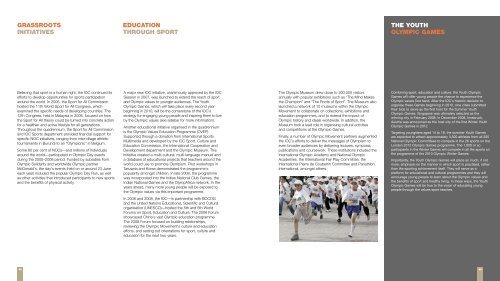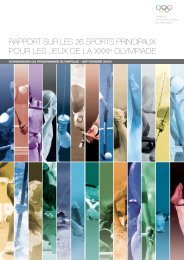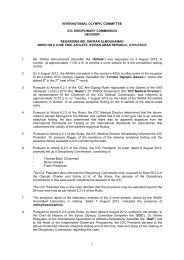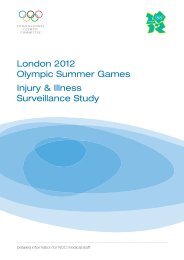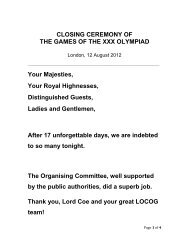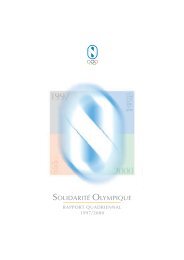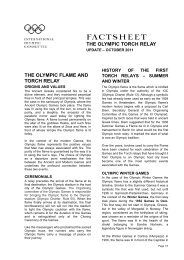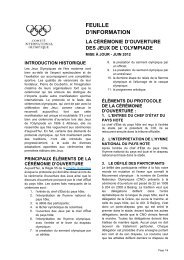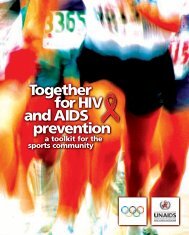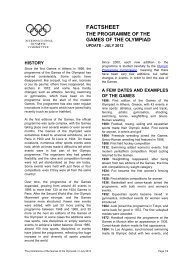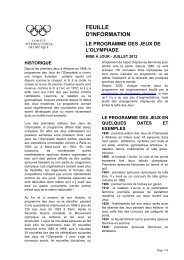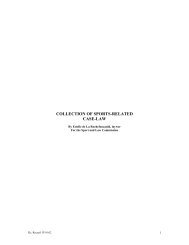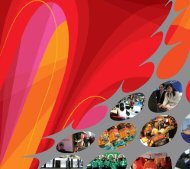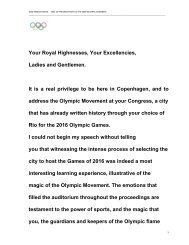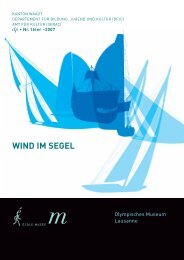3912 reportcomplete final web:layout 1
3912 reportcomplete final web:layout 1
3912 reportcomplete final web:layout 1
You also want an ePaper? Increase the reach of your titles
YUMPU automatically turns print PDFs into web optimized ePapers that Google loves.
GRASSROOTS<br />
INITIATIVES<br />
Believing that sport is a human right, the IOC continued its<br />
efforts to develop opportunities for sports participation<br />
around the world. In 2006, the Sport for All Commission<br />
hosted the 11th World Sport for All Congress, which<br />
examined the specific needs of developing countries. The<br />
12th Congress, held in Malaysia in 2008, focused on how<br />
the Sport for All theory could be turned into concrete action<br />
for a healthier and active lifestyle for all generations.<br />
Throughout the quadrennium, the Sport for All Commission<br />
and IOC Sports department provided financial support for<br />
specific NOC initiatives, ranging from inter-village athletic<br />
tournaments in Burundi to an “Olympicnic” in Belgium.<br />
Some 80 per cent of NOCs—and millions of individuals<br />
around the world—participated in Olympic Day events<br />
during the 2005–2008 period. Funded by subsidies from<br />
Olympic Solidarity and worldwide Olympic partner<br />
McDonald’s, the day’s events (held on or around 23 June<br />
each year) included the popular Olympic Day Run, as well<br />
as other activities that introduced participants to new sports<br />
and the benefits of physical activity.<br />
48<br />
EDUCATION<br />
THROUGH SPORT<br />
A major new IOC initiative, unanimously approved by the IOC<br />
Session in 2007, was launched to extend the reach of sport<br />
and Olympic values to younger audiences. The Youth<br />
Olympic Games, which will take place every second year<br />
beginning in 2010, will be the cornerstone of the IOC’s<br />
strategy for engaging young people and inspiring them to live<br />
by the Olympic values (see sidebar for more information).<br />
Another educational initiative organised in the quadrennium<br />
is the Olympic Values Education Programme (OVEP).<br />
Supported through a donation from International Sports<br />
Multimedia and developed by the IOC Sport, Culture and<br />
Education Commission, the International Cooperation and<br />
Development department and the Olympic Museum. This<br />
initiative created a multi-cultural, multi-language manual and<br />
a database of educational projects that teachers around the<br />
world could use to promote Olympism. Pilot workshops in<br />
Tanzania and Korea demonstrated the programme‘s<br />
popularity amongst children. In late 2008, the programme<br />
was incorporated into the Indian National Club Games, the<br />
Indian National Games and the OlympAfrica network. In the<br />
years ahead, many more young people will be exposed to<br />
the Olympic values via this important programme.<br />
In 2006 and 2008, the IOC—in partnership with BOCOG<br />
and the United Nations Educational, Scientific and Cultural<br />
organisation (UNESCO)—hosted the 5th and 6th World<br />
Forums on Sport, Education and Culture. The 2006 Forum<br />
showcased China’s vast Olympic education programme.<br />
The 2008 Forum focused on building relationships,<br />
reviewing the Olympic Movement’s culture and education<br />
efforts, and setting out orientations for sport, culture and<br />
education for the next two years.<br />
The Olympic Museum drew close to 200,000 visitors<br />
annually with popular exhibitions such as “The Mind Makes<br />
the Champion” and “The Roots of Sport”. The Museum also<br />
launched a network of 10 museums within the Olympic<br />
Movement to collaborate on collections, exhibitions and<br />
education programmes, and to extend the impact of<br />
Olympic history and ideals worldwide. In addition, the<br />
Museum took a lead role in organising cultural activities<br />
and competitions at the Olympic Games.<br />
Finally, a number of Olympic Movement partners augmented<br />
the IOC’s efforts to deliver the messages of Olympism to<br />
even broader audiences by delivering lectures, symposia,<br />
publications and coursework. These institutions included the<br />
International Olympic Academy and National Olympic<br />
Academies, the International Fair Play Committee, the<br />
International Pierre de Coubertin Committee and Panathlon<br />
International, amongst others.<br />
THE YOUTH<br />
OLYMPIC GAMES<br />
Combining sport, education and culture, the Youth Olympic<br />
Games will offer young people the chance to experience the<br />
Olympic values first hand. After the IOC’s historic decision to<br />
organise these Games beginning in 2010, nine cities submitted<br />
their bids to serve as the first host for the Summer Youth<br />
Olympic Games. Singapore was ultimately selected as the<br />
winning city in February 2008. In December 2008, Innsbruck,<br />
Austria was announced as the host city of the first Winter Youth<br />
Olympic Games in 2012.<br />
Targeting youngsters aged 14 to 18, the summer Youth Games<br />
are expected to attract approximately 3,500 athletes from all 205<br />
National Olympic Committees to compete in the 26 sports on the<br />
London 2012 Olympic Games programme. The 1,000 or so<br />
participants in the Winter Games will compete in all the sports on<br />
the programme of the 2010 Olympic Winter Games.<br />
Importantly, the Youth Olympic Games will place as much, if not<br />
more, emphasis on the manner in which sport is practised, rather<br />
than the sporting achievement itself. They will serve as a<br />
platform for educational and cultural programmes and they will<br />
encourage young people to learn about the Olympic values and<br />
the benefits of sport and healthy living. In these ways, the Youth<br />
Olympic Games will be true to the vision of educating young<br />
people through the values sport teaches.<br />
49


